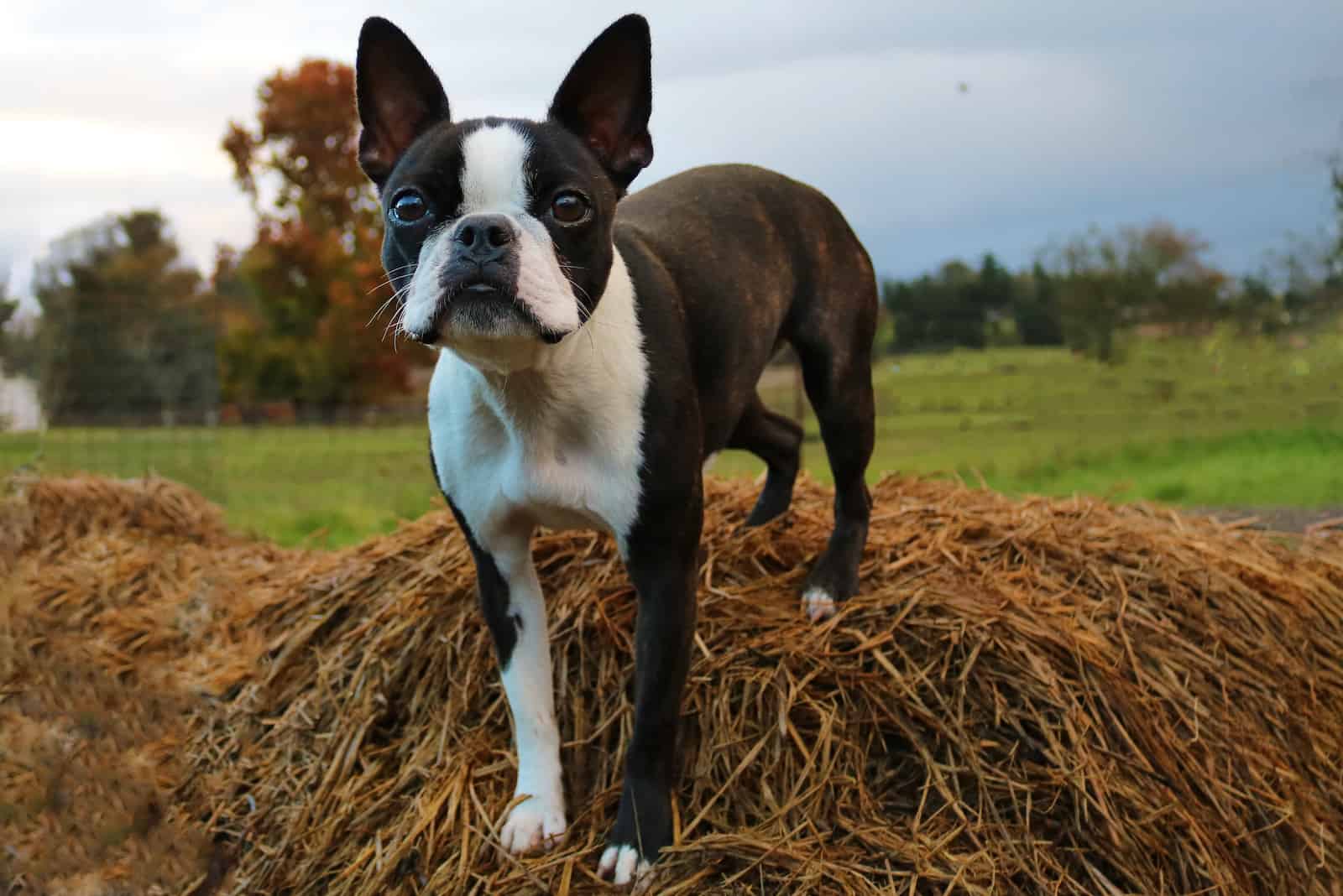Originally bred to be fighting dogs, the Boston Terriers we know today are completely different. Their loving, caring, and playful nature makes them great companions for families that have children, and they are considered to be one of the most suitable dogs for living in an apartment.
Being the best dog parent, as we know you are, you keep track of everything. We are here to help you with the size, growth, and weight of your Boston Terrier by presenting you with a Boston Terrier growth chart, and also a weight chart that will help with all of your potential doubts and concerns.
Boston Terrier Growth Chart: 6 Growth Stages
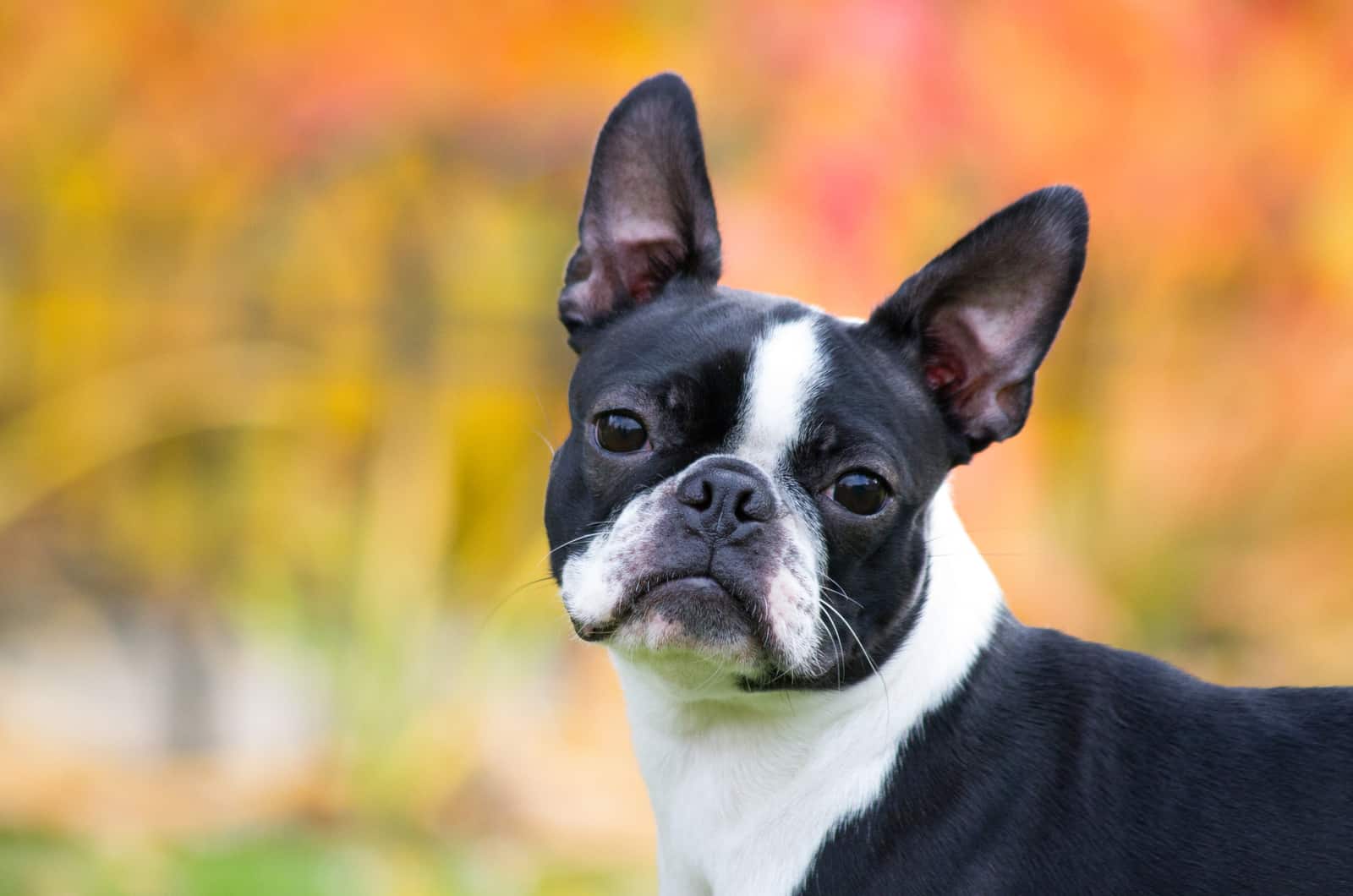
Is my Boston Terrier big enough? Is it weighing as much as it’s supposed to? When do they stop growing? Are they finished growing? These are just some of the questions you may ask yourself. I am sure we will give you all the answers that you need, but first, we need to start with the basics.
The process of growing varies between large dog breeds, medium dog breeds, and small dog breeds. Larger breeds like the German Shepherd, the Great Dane, the Mastiff, the Boxer, etc. can grow for as long as two to two and a half years.
Boston Terriers can fit in the category with bulldogs or beagles, and they finish growing around 10 to 14 months, while dogs that are small in size, a.k.a., small breeds like chihuahuas or pugs take even less time.
How does that process go? Well, we are here to explain the 6 stages of development of the Boston Terrier.
1. Birth To Two Weeks: The Neonatal Period.
This period is crucial for a small puppy. They are fragile. In the first 10 days, their sight and hearing aren’t developed. During this period of growth, all they do is sleep and eat (not much has changed, huh? Just kidding).
They can barely crawl, let alone walk by themselves. They are toothless, and they live on their mother’s milk. After 10 days, their eyes gradually start to open.
Even though they are fragile, this is the fastest-growing phase. Most of us, unless we are dog breeders or foster parents, don’t see our puppies at this stage since they are still with their mother.
During this stage, they will usually just weigh 0.48 pounds (or 0.22 kilograms).
Is Mother Care Important For Puppy Development?
The mother is the most important part of a puppy’s life at this point. They are dependent on her for various things.
The most important thing is, of course, food and warmth. The best food choice, just like with we humans, is their mother’s milk, which is full of nutrients that barely any store-bought food can replace. Warmth is also one of the most important aspects when it comes to puppy development and survival.
Besides this, the mother has to ensure that puppies urinate and defecate. Cleaning the area is quite important since puppies can barely crawl; they don’t get far enough to pee in a separate location.
2. Two To Three Weeks: The Transitional Stage.
We might say that this is the most interesting stage to observe. Puppies are getting used to their eyes. They start exploring a bit, and can even find a place that is most soothing for them.
They start having playtime with their siblings, and can show emotions since they can, at times, growl and even wag their tail.
Their hearing also starts to accrue, so they can react to your voice and other auditory stimulations.
You can introduce them to wet puppy food since their teeth start showing a bit, but they are still mostly dependent on their mother’s milk.
Their weight will then be around 4.40 pounds (or 2 kilograms).
3. Three To 12 Weeks: The Socialization Period.
This stage is usually the stage when we finally bring home our new puppy!
Socialization is very important because it can determine how your Boston Terrier puppy will behave for the rest of its life. Puppies are aware of their surroundings.
From weeks three to four, puppies learn how to control their bladder and bowel movements, so they figure out that the place where they sleep isn’t the best place for peeing.
Puppies at this stage are learning how to communicate with their siblings; in other words, they start to bark. Curiosity is kicking in, so exploring isn’t rare.
Six weeks old is the time for their first vaccination.
They will be 6.60 pounds (or 3 kilograms) when they hit the three-month mark.
Is Socializing My Dog Important?
YES! Socializing your dog is essential, and it should start as soon as possible.
If you are a friendly person, you would for sure like your dog to be just as friendly as you. By exposing your Boston Terrier to new experiences, people, and dogs, you are removing any potential fear and suspicion that your dog might have.
Their personality can be altered with good socializing.
It might sound strange when you mention altering someone’s personality, but if you have a dog that is used to human touch and dog interactions, playtime in the dog park will be much more pleasant. Your dog will have the comfort of meeting new human and dog friends, receiving a lot of pets, and having endless quality playtime.
Unfortunately, a dog that stays scared of other dogs might get aggressive and won’t be able to play with other dogs, which, by itself, is a big problem.
One more important thing you should introduce your dog to is some alone time. When you leave for work, your puppy is probably going to be home alone, which, if they are taught properly, won’t be that big of a problem for them, so don’t feel guilty leaving them for a short period of time.
4. 12 Weeks Until Six Months: The Juvenile Period.
The juvenile period is what we might call the ˝teenage years˝.
This period might be compared with we humans since dogs go through things that we also go through. They are reaching their final adult size, growing adult teeth, and gaining adult weight, and their sexual maturity starts showing by developing sexual interests.
Socializing needs to continue in this period by introducing them to new smells, sounds, and people.
Around six months, female dogs will experience their first heat cycle, and male dogs start showing interest in them.
They’ll be more or less 8.8 pounds (or 4 kilograms) when they become four months old, 12.12 pounds (or 5.5 kilograms) by 5 months, and 14.3 pounds (or 6.5 kilograms) by six months.
5. Six To 18 Months: Adolescence.
Young adulthood has arrived.
Like almost every young adult, Boston Terriers become a bit mischievous. They might show signs of aggression, which is usually connected to showing dominance with other dogs, disobeying you from time to time, and showing a lack of interest in socializing.
Energy levels go through the roof. The combination of all of these might discourage you from training your dog, but don’t give up… you can do this.
In their 8th month, they will weigh up to 19.84 pounds (or 9 kilograms).
Should My Boston Terrier Be Spayed or Neutered At This Point?
Spaying and neutering are very important processes that are recommended to be done around six months of age.
It prevents unwanted pregnancies, and it lowers aggression and marking behaviors.
6. Adulthood.
The lifespan from birth to adulthood flies so quickly, doesn’t it?!
Your dog is fully developed. All you need to do is give unconditional love and enjoy every minute with your best friend.
They might weigh up to 23.14 pounds (or 10.5 kilograms).
Do Boston Terriers Come In One Size?
According to the AKC (American Kennel Club), Boston Terriers have standard sizes. There are three classifications:
· 15 pounds (6.8 kg) and below
· 15 pounds (6.8 kg) and below 20 pounds (9kg)
· 20 pounds (9kg) and below 25 pounds (11.3 kg)
When it comes to this, you need to be well informed about good Boston Terrier breeders. A good breeder who preserves the standard will never breed a Boston Terrier that is below 13 pounds (5.8 kg) or over 30 pounds (13.6 kg).
Female Boston Terrier vs. Male Boston Terrier: Size
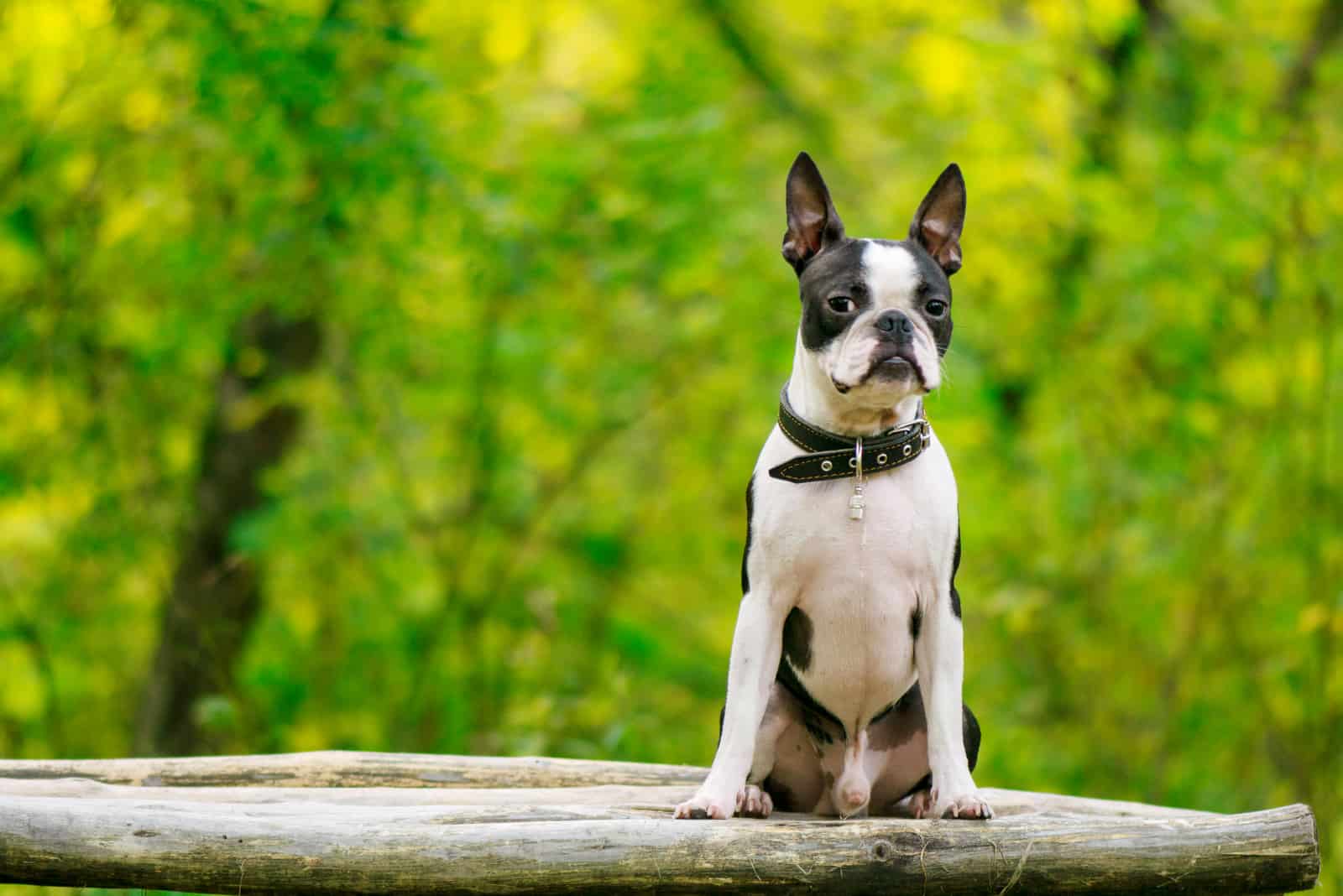
Both genders of Boston Terriers are very close to their size.
Female Boston Terriers might stop their growing process at the 12-month mark, while male Boston Terriers may take up to 14 months.
Female Boston Terrier Weight And Growth Chart
Female dogs, although a bit smaller, grow faster than male dogs. This Boston Terrier growth chart is just so you can have a clue as to what weight and size you can expect. If it doesn’t match perfectly, it shouldn’t be a problem.
[table id=398 /]
Male Boston Terrier Weight And Growth Chart
In general, male dogs tend to get a bit bigger than female dogs. The average size of a male Boston Terrier is 18 pounds (8 kg).
[table id=399 /]
Three Factors That Can Affect Boston Terrier Puppy Growth
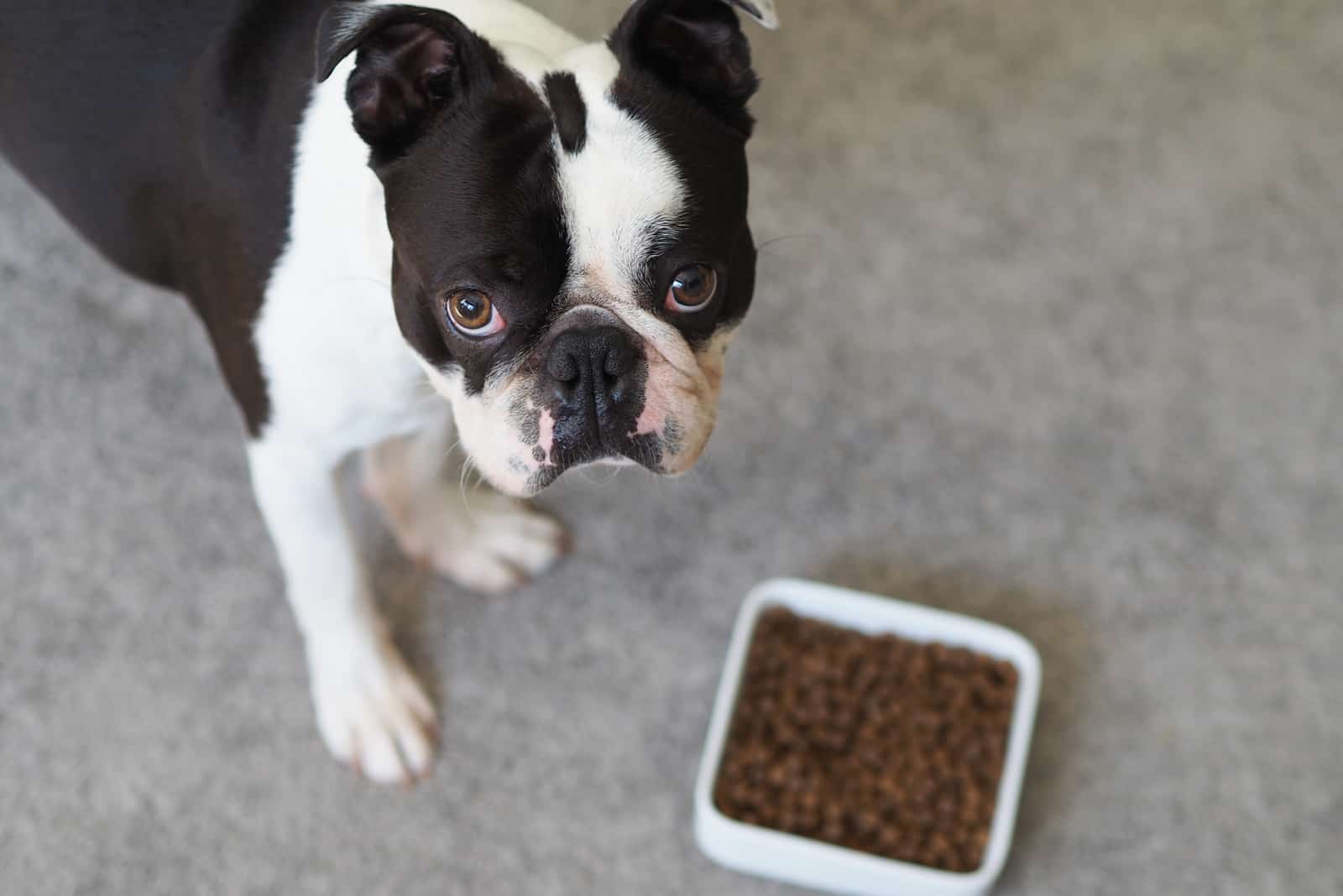
1. Genetics.
Parents play an important role in your dog’s life when it comes to passing on genetics.
While they can carry some health problems, they can also determine which size your dog might be. When buying a puppy, you should insist on meeting its parents. If you have two big parents, you just might end up with a bigger dog, and vice versa.
2. Nutrition.
You need to give your dog food that is high in nutrients since they are one of the key factors of your dog’s growth process. You must do thorough research on the type of dog food you will buy for your pet since a lot of cheaper ones can contain nutrients that are inadequate or even dangerous for your puppy.
Make sure to dose the food properly. Inappropriate dosing can cause obesity or malnutrition, which leads to dozens of other issues.
3. Physical Activity And Health.
Boston Terriers are quite playful and energetic dogs, and they need a lot of exercise to get them through the day.
Exercising isn’t only for their mental state, but more importantly, it is for their physical health. Bone structure as well as the cardiac system benefit from physical activity as it makes them stronger and more resilient.
When Do Boston Terriers Stop Growing?
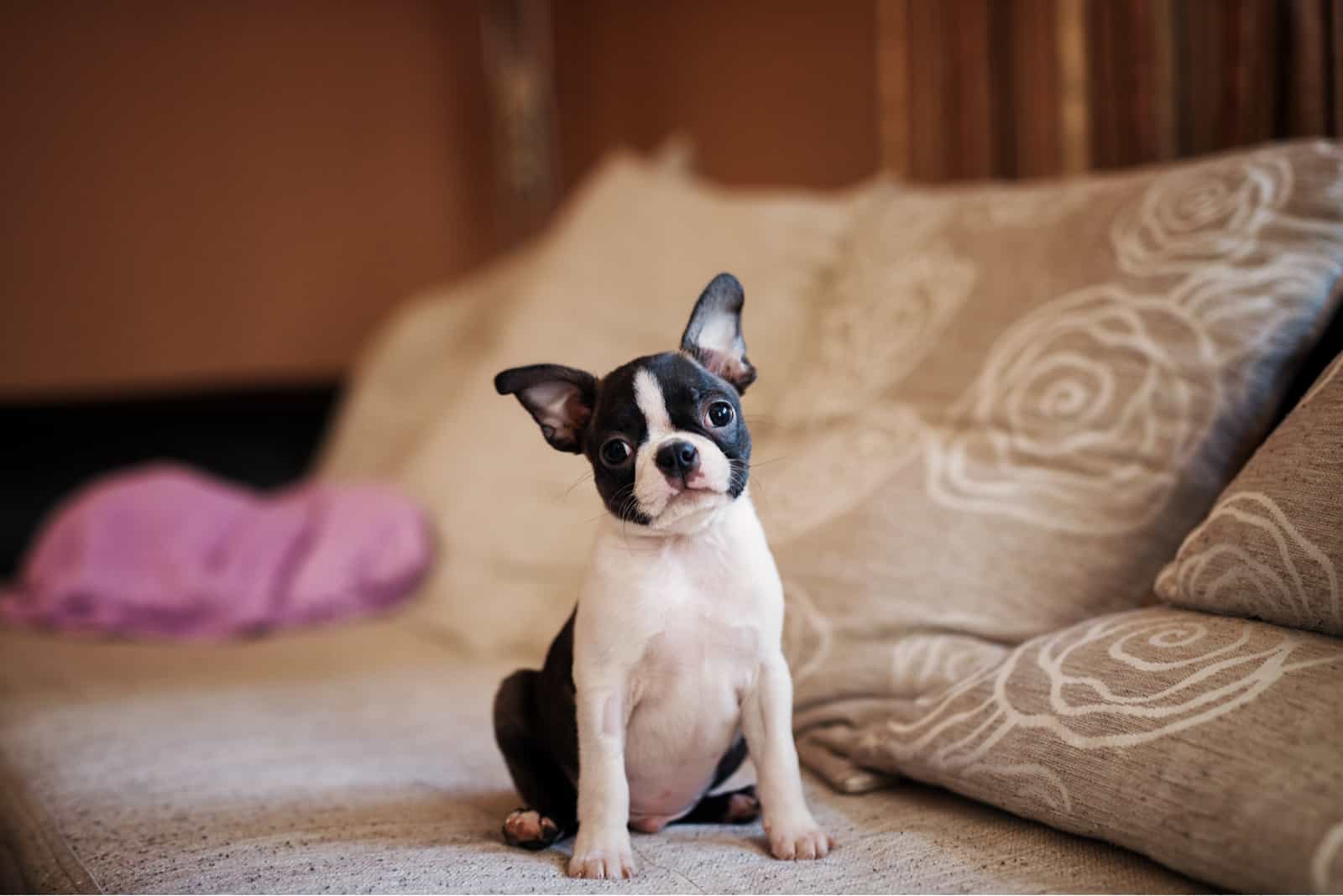
Once a dog reaches the one-year mark, it is considered an adult. Boston Terriers have twice as less growth time than large dogs.
At about 10 to 14 months, Boston Terriers are finished with their growth. There are always exceptions, but it probably isn’t going to surpass the 14-month mark. They are most likely to stop growing between 10 and 12 months.
They have rapid growth in their first year, so you should have your regular checks done with the vet.
Can You Predict Your Boston Terriers’ Puppy Growth?
There are a couple of ways you might tell if you are going to end up with a bigger or a smaller dog.
One of these ways is by their paws. It’s estimated that around 10 weeks, your Boston Terrier’s paw size will be proportionate to its adult size.
Loose skin can also be an indicator. Boston Terriers as a breed don’t have loose skin when they are adults, which means that if puppies have more loose skin, it might indicate that you will end up with a bigger dog.
Parents are also some type of measurement. If you have two bigger parents, the odds are that your pup might end up being just like them.
P.S. These are not scientific methods, nor are they accurate. They might only give you an idea of what might await you.
Boston Terrier Weight Chart: How Much Should A Boston Terrier Weigh?
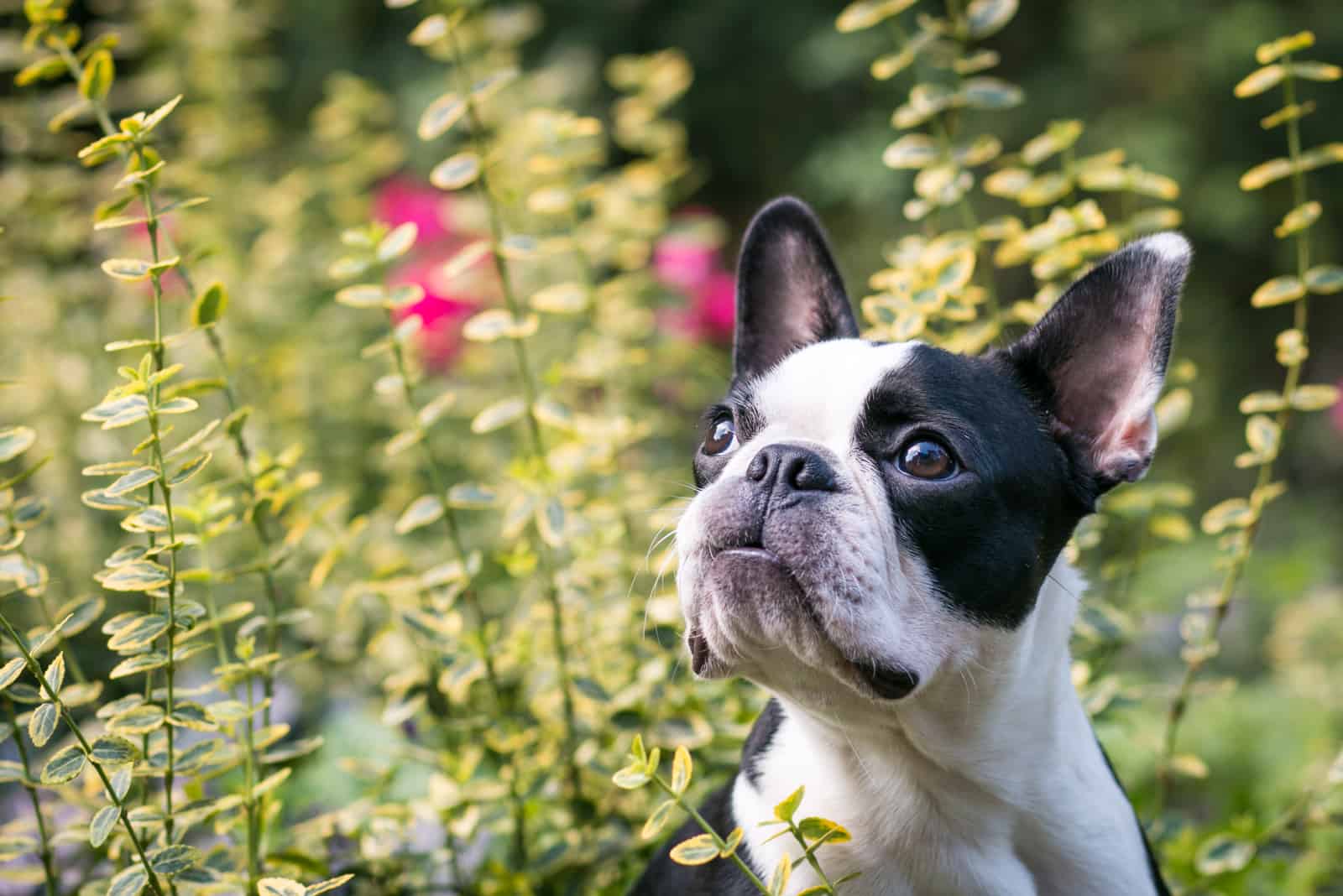
Most bigger breeds vary in weight when it comes to males and females. As mentioned, female and male Boston Terriers have some differences, but nothing significant (you can see the Boston Terrier growth chart in the previous bit, ˝Female vs. Male Boston Terrier).
Puppy Weight Chart
[table id=400 /]
Ways To Weigh Your Dog: Weight Calculator
One way you can potentially calculate your dog’s weight is by taking its weight when it is 23 weeks, and multiplying it by two.
Another formula you can use is:
1. Growth = current weight / current age in weeks.
2. Adult weight = growth x 52 (number of weeks in one year).
So, for example, if your 14-week-old pup weighs 20 pounds, you simply divide the current weight by their age in weeks, and multiply the result by 52:
20 / 14 = 1.4
1.4 x 52 = 72.8 pounds
72.8 pounds would be the expected weight of your adult-sized Boston Terrier.
A weight calculator is also one of the ways. All you need to do is put in your dog’s weight and age. Your dog’s adult weight will then be displayed.
Do You Need To Control Your Boston Terriers’ Weight?
Just like we humans, dogs need to have a controlled diet. They can’t do it themselves, so we are here for the rescue.
Following a meal plan and scheduling a meal plan means that you are not overfeeding your dog. Meals at the exact time of the day make your dog’s stomach used to a certain amount of food at a certain point during the day.
Ensuring your dog has enough sleep is an important factor as well. Even the hypest of them all need at least 11 to 12 hours of sleep.
Dedicated time for exercise keeps your pup in shape. At least an hour a day should do the trick.
Do note that the following issues carry over to Boston Terrier mixes as well.
Health Issues That Can Be Caused By Uncontrolled Weight
Reproductive Difficulties
Obese females may have a smaller litter, high-risk pregnancies, and the possibility of a fake pregnancy. Underweight females might experience less milk production, and have the potential of losing their babies while pregnant.
Heart Disease
Heart disease is common among elder Boston Terriers, but it is one of the biggest problems that a dog can face when being overweight.
Bone Problems
This can be inherited genetically, but usually, it comes with excess weight. Excess weight can slow down the growth of cartilage, while on the other hand, a lack of nutrients and exercise make their bones weak and stiff.
Respiratory Distress Syndrome
Boston Terriers have a specific skull structure, which makes their breathing a bit more difficult naturally. Obesity can increase their blood flow and make their breathing even harder than it already is.
Obesity
Dog food with a lot of carbs, along with a lack of exercise and playtime can be a dangerous combination.
Weight Loss
Food that lacks nutrients, and smaller food intake, combined with high energy demands are a formula for weight loss. If you see your dog struggling with eating, take it to the nearest vet.
My Dog Isn’t At The Weight That Is Recommended: Can That Be A Problem?
Depending on their age, Boston Terriers weigh 10 to 25 pounds. Always monitor your dog’s time spent playing and being active, along with the way they eat and the amount they digest.
If your dog is over the recommended weight and experiencing weight gain for a short period of time, it might just mean that during that period of time, they aren’t getting enough active time, and are eating a bit more than usual.
If your dog is a bit under the recommended weight, you need to detect if it’s because of too much playtime that is not backed up with enough food, or if there might be a problem.
Unfortunately, there is no better answer than visiting the vet. Your vet will either solve any potential problem your dog might have, or take the burden off your chest by saying that your dog just loves to eat or play a bit more than other dogs.
What Type Of Dog Food Should You Be Giving To Your Boston Terrier
At the beginning of their journey with food, after they have separated from their mother’s milk, meals should be soft, wet, and full of nutrients that will help puppies grow big and strong (fats and proteins).
There is a thing called ˝All Life Stages˝ puppy food, which prepares them better for adult food.
Plenty of food companies for dogs are now on the market, so you can try and offer them a couple of different ones in order to see which one they like the best.
You need to make sure that the food doesn’t consist of many carbohydrates, doesn’t make your dog sick, and consists of all the nutrients that are beneficial for your dog.
FAQ:
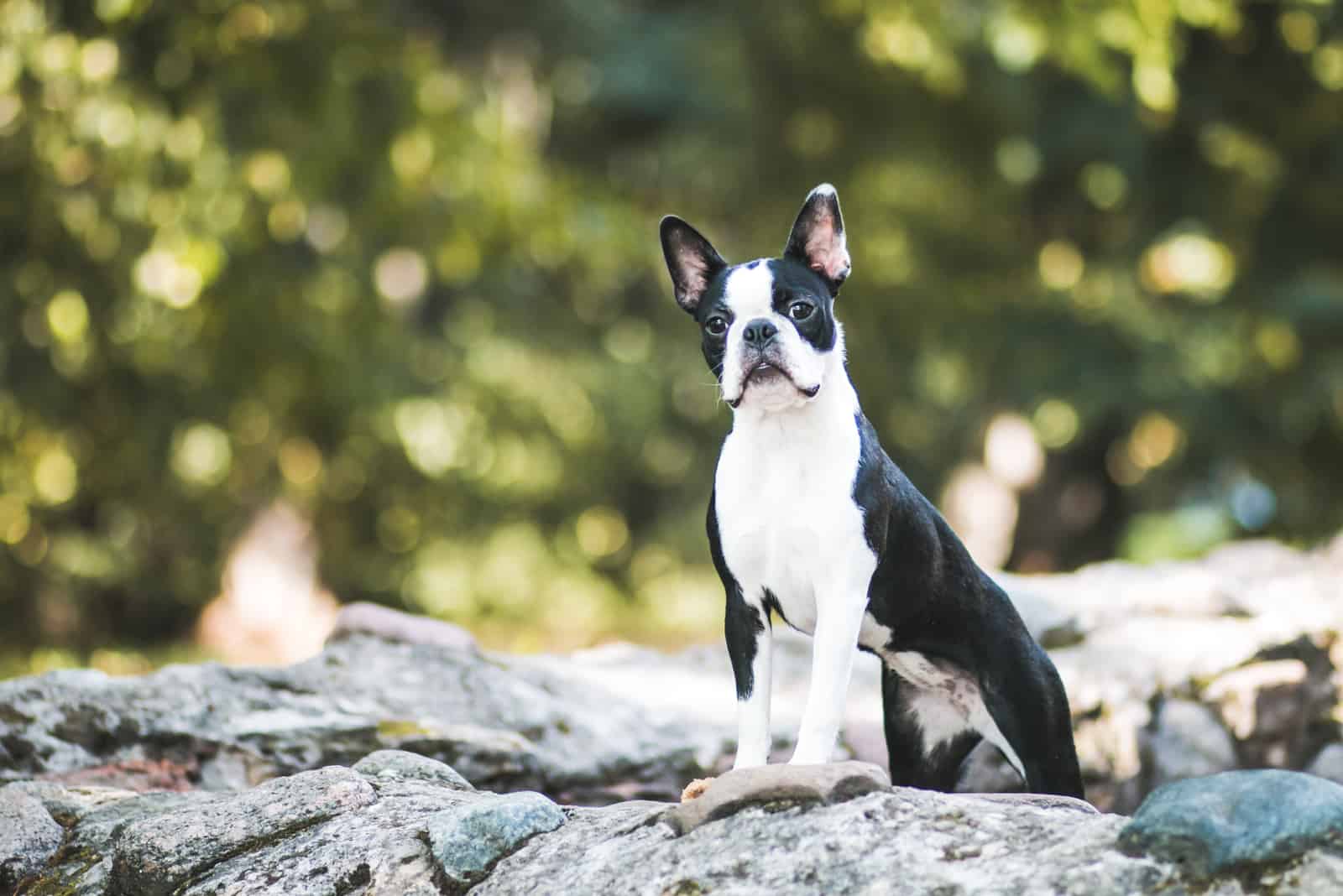
What Is The Life Expectancy Of Boston Terriers?
Your Boston Terrier can keep you company for 11 to 13 years. It might seem like a lot, but as we all know, time flies. Cherish every moment spent with your doggo.
Is The Boston Terrier A Small Or A Medium Breed?
According to the American Kennel Club, a Boston Terrier is a small breed. As you can see in the Boston Terrier growth chart, nothing more than 25 lbs is considered good for this breed.
The same goes for any of its variants like the ever popular, gentlemanly blue Boston Terrier, and his red-furred Terrier cousin.
Many people confuse them to be a teacup-sized dog breed, but they’re well over that size category.
Are Boston Terriers Hypoallergenic?
Unfortunately, Boston Terriers aren’t hypoallergenic.
While they don’t have a lot of hair to go around, their dander is a common allergen for allergy sufferers, so if you’re considering getting a
Boston Terrier, you may want to double check whether or not you’re allergic to their dander.
In Conclusion
The Boston Terrier growth chart and weight chart are full of information that you need when you are concerned about your puppy’s size and weight. Going through all of the growth process of your precious dog reminded us that time truly does fly by, so enjoy all the sizes that your dog goes through.
Read Next:
• Brown Boston Terrier: Interesting Facts & Characteristics
• Keeping Up With The Border Terrier Growth Chart
